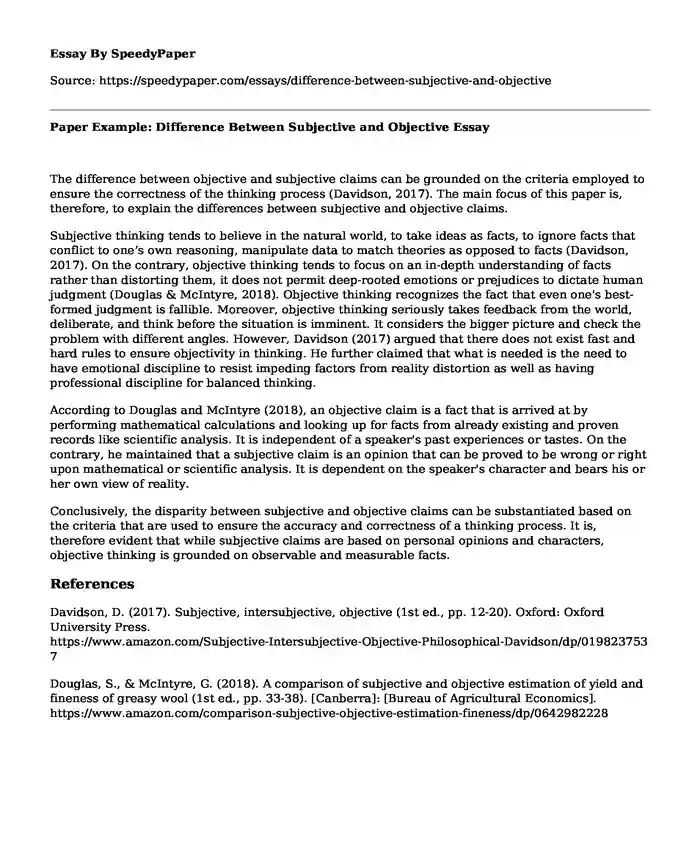
| Essay type: | Compare and contrast |
| Categories: | Psychology Intelligence Emotional intelligence |
| Pages: | 2 |
| Wordcount: | 393 words |
The difference between objective and subjective claims can be grounded on the criteria employed to ensure the correctness of the thinking process (Davidson, 2017). The main focus of this paper is, therefore, to explain the differences between subjective and objective claims.
Subjective thinking tends to believe in the natural world, to take ideas as facts, to ignore facts that conflict to one’s own reasoning, manipulate data to match theories as opposed to facts (Davidson, 2017). On the contrary, objective thinking tends to focus on an in-depth understanding of facts rather than distorting them, it does not permit deep-rooted emotions or prejudices to dictate human judgment (Douglas & McIntyre, 2018). Objective thinking recognizes the fact that even one's best-formed judgment is fallible. Moreover, objective thinking seriously takes feedback from the world, deliberate, and think before the situation is imminent. It considers the bigger picture and check the problem with different angles. However, Davidson (2017) argued that there does not exist fast and hard rules to ensure objectivity in thinking. He further claimed that what is needed is the need to have emotional discipline to resist impeding factors from reality distortion as well as having professional discipline for balanced thinking.
According to Douglas and McIntyre (2018), an objective claim is a fact that is arrived at by performing mathematical calculations and looking up for facts from already existing and proven records like scientific analysis. It is independent of a speaker's past experiences or tastes. On the contrary, he maintained that a subjective claim is an opinion that can be proved to be wrong or right upon mathematical or scientific analysis. It is dependent on the speaker's character and bears his or her own view of reality.
Conclusively, the disparity between subjective and objective claims can be substantiated based on the criteria that are used to ensure the accuracy and correctness of a thinking process. It is, therefore evident that while subjective claims are based on personal opinions and characters, objective thinking is grounded on observable and measurable facts.
References
Davidson, D. (2017). Subjective, intersubjective, objective (1st ed., pp. 12-20). Oxford: Oxford University Press. https://www.amazon.com/Subjective-Intersubjective-Objective-Philosophical-Davidson/dp/0198237537
Douglas, S., & McIntyre, G. (2018). A comparison of subjective and objective estimation of yield and fineness of greasy wool (1st ed., pp. 33-38). [Canberra]: [Bureau of Agricultural Economics]. https://www.amazon.com/comparison-subjective-objective-estimation-fineness/dp/0642982228
Cite this page
Paper Example: Difference Between Subjective and Objective. (2023, Nov 19). Retrieved from https://speedypaper.com/essays/difference-between-subjective-and-objective
Request Removal
If you are the original author of this essay and no longer wish to have it published on the SpeedyPaper website, please click below to request its removal:
- Free Essay: Security Management Within the Industry
- Free Essay on the Impact of the French Revolution and Enlightenment on the Haitian Revolution
- Essay Sample on Claire's Treatment Plan and Referral Services
- Free Essay. Norodom Sihanouk Central Neutral Policies and Implementation Before and After Independence
- Essay Example: Movie Review on (Remember the Titans)
- Paper Example: The Treatment of Varicose Veins in Pregnant Women
- Canadian Immigration - Ethics - The Code of Professional Ethics and Ethical Dilemmas
Popular categories




